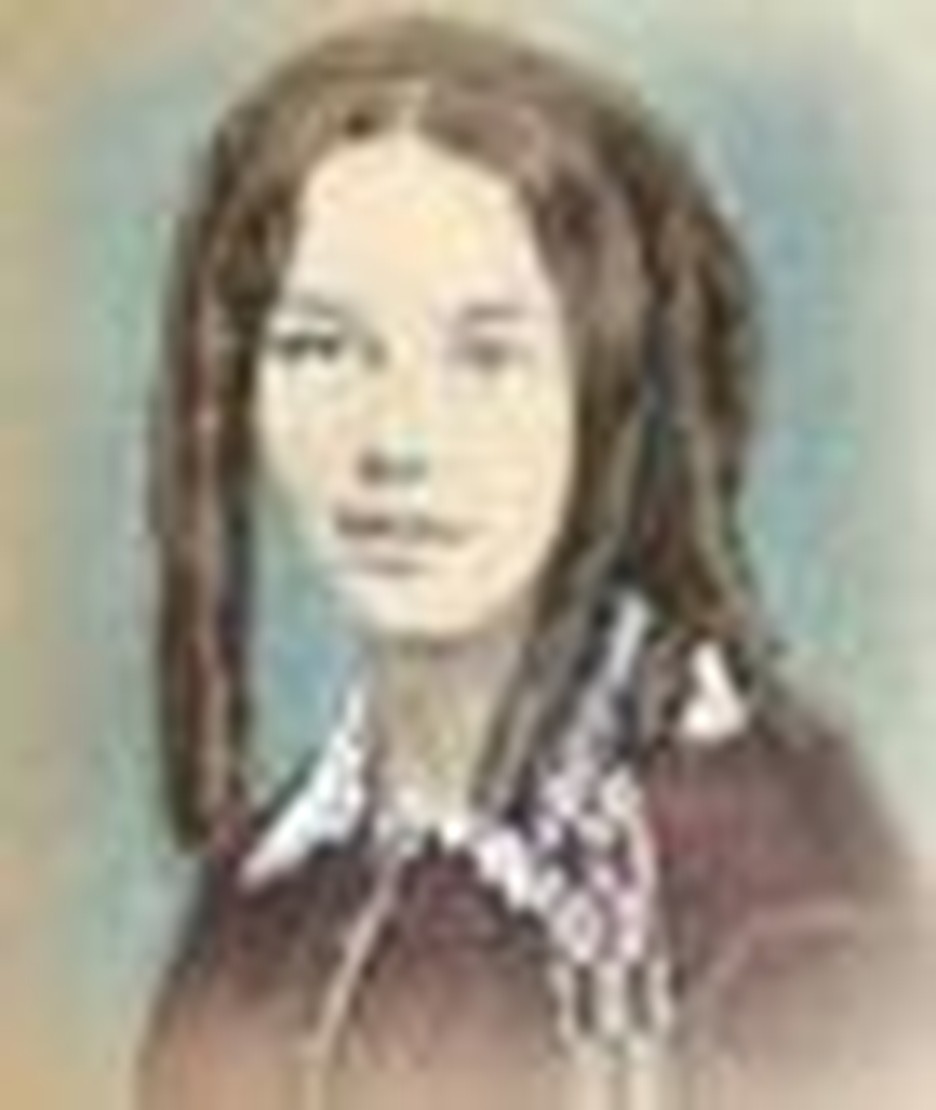
London buzzed with raves about the eloquent nineteen year old preacher, but Susannah Thompson was decidedly unimpressed when she first saw and heard him December 18, 1853. That was the first Sunday the young Charles Spurgeon preached at New Park Street Church. She commented: "So this is his so-called eloquence! It does not impress me. What a painful countrified manner! Will he ever quit making flourishes with that terrible blue silk handkerchief! And his hair --why, he looks like a barber's assistant!"
God Himself United Our Hearts
Yet, Susannah came to know Christ and grow under Spurgeon's teaching and ministry. When Susannah was concerned about her spiritual state, Charles sent her a copy of Bunyan's The Pilgrim's Progress inscribed, "Miss Thompson, with desires for her progress in a blessed pilgrimage, from C. H. Spurgeon." On June 20, 1854 the two young people attended the brilliant opening of London's Crystal Palace together. Charles Spurgeon read Susannah a few lines from a book he was reading: "Seek a good wife of thy God, for she is the best gift of His providence. . . . If thou art to have a wife of thy youth, she is now living on the earth; therefore think of her, and pray for her weal." Spurgeon asked Susannah in a soft voice, "Do you pray for him who is to be your husband?" Susannah's heart raced, her eyes fell, and she blushed at the young pastor's words. After the opening ceremonies, the young couple walked together through the Crystal Palace, the gardens, and down to the lake. Susannah wrote years later: "During that walk, in that memorable day in June, I believe God Himself united our hearts in indissoluble bonds of true affection, and though we knew it not, gave us to each other forever."
On August 2, 1854, Charles and Susannah declared their love for each other in her grandfather's garden. Susannah later wrote with great awe "I left my beloved, and hastening to the house and to an upper room, I knelt before God, and praised and thanked him, with happy tears, for His great mercy in giving me the love of so good a man. If I had known, then, how good he was, and how great he would become, I would have been overwhelmed, not so much with the happiness of being his, as with responsibility which such a position would entail."
It's Just Like Him!
During their courtship Charles and Susannah developed a kinship in spiritual things which only deepened in married life. They spent time reading together Jonathan Edwards, Richard Baxter, and other old Puritan writers. Together they published a collection of Puritan theology called Smooth Stones Taken from Ancient Brooks. From the beginning, their spiritual love was the bond that strengthened their earthly love. In January, 1855, after he had received from Susannah a letter full of deep spiritual, heartfelt longing for the things of God, Charles wrote her, Dear purchase of a Savior's blood, your are to me a Savior's gift, and my heart is full to overflowing with the thought of such continued goodness. I do not wonder at His goodness, for it is just like Him; but I cannot but lift up the voice of joy at His manifold mercies. Whatever befall us, trouble and adversity, sickness or death, we need not fear a final separation, either from each other, or our God. I am glad you are not here just at this moment, for I feel so deeply that I could only throw my arms around you and weep. May the choicest favors be thine, may the Angel of the Covenant be thy companion, may thy supplications be answered, and may thy conversation be with Jesus in heaven!
Charles and Susannah Spurgeon were married on January 9, 1856. Their love grew in the ensuing years; the many trials and troubles each faced only strengthened their spiritual oneness. By the time he was thirty Spurgeon suffered from gout and its accompanying depression. Susie, as Charles called her, also was ill and did not leave the house for fifteen years. Yet, through difficulties and problems, both were able to have important Christian ministries.
Charles Spurgeon became the most famous preacher in Victorian England. He was a tourist attraction, and many came to London just to hear him preach at the famed Metropolitan Tabernacle, which held six thousand people. A powerful expositor of the Scriptures and an eloquent evangelist, Spurgeon also founded a pastor's college and orphanage that still exist today. His sermons were published weekly, and many of his writings continue to be published and still read today.
She Fitted "Tirshatha" For Service
Though an invalid much of her life, Susannah reared their twin sons, both of whom entered Christian ministry. She also established and operated a book fund to distribute Spurgeon's books and writings free to pastors. Charles did not like to be called "reverend," so Susie's special name for him was "Tirshatha," which was the Persian word for "the revered one." Through trials and service, the Spurgeons' love for the Lord and each other only strengthened over time. Each was the greatest support of the other, and their spiritual bond deepened their love.
Charles' letters when the two had to be apart reveal the love that continued throughout their lives. In 1871 Spurgeon wrote Susie: My Own Dear one--None know how grateful I am to God for you. In all I have ever done for Him, you have a large share. For in making me so happy you have fitted me for service. Not an ounce of power has ever been lost to the good cause through you. I have served the Lord far more, and never less, for your sweet companionship. The Lord God Almighty bless you now and forever!
And later in the same year:
I have been thinking over my strange history, and musing on eternal love's great river-head from which such streams of mercy have flowed to me. . . . Think of the love which gave me that dear lady for a wife, and made her such a wife; to me, the ideal wife, and, as I believe, without exaggeration or love-flourishing, the precise form in which God would make a woman for such a man as I am, if He designed her to be the greatest of all earthly blessings to him; and in some sense a spiritual blessing, too, for in that also am I richly profited by you, though you would not believe it. I will leave this ‘good matter' ere the paper is covered; but not till I have sent you as many kisses as there are waves on the sea.
Devoted Lover, Tender Husband
Most of the letters we have between Charles and Susie are found in his autobiography, which Susie edited after his death. In publishing these Susannah wrote: I have been trying in these pages to leave the 'love' out of the letters as much as possible, lest my precious things should appear but platitudes to my readers, but it is a difficult task; for little rills of tenderness run between all the sentences, like the singing, dancing waters among the boulders of a brook, and I cannot still the music altogether. To the end of his beautiful life it was the same, his letters were always those of a devoted lover, as well as of a tender husband; not only did the brook never dry up, but the stream grew deeper and broader, and the rhythm of its song waxed sweeter and stronger.
Happy woman and happy man! If Heaven be found on earth, they have it! At last, the two are so blended, so engrafted on one stem, that their old age presents a lovely attachment, a common sympathy, by which its infirmities are greatly alleviated, and its burdens are transformed into fresh bonds of love. So happy a union of will, sentiment, thought, and heart exists between them, that the two streams of their life have washed away the dividing bank, and run on as one broad current of united existence till their common joy falls into the ocean of eternal felicity.
Charles and Susannah had been married thirty-six years when Charles died in 1892. Susannah wrote, "for though God has seen fit to call my beloved up to higher service, He has left me the consolation of still loving him with all my heart, and believing that our love shall be perfected when we meet in that blessed land where Love reigns supreme and eternal."
The Model Marriage
"Founded on pure love and cemented in mutual esteem."
Spurgeon died in the late nineteenth century. His views on wives, marriage, and relationship may seem quaint and strange in a world where most women find it necessary to work outside the home. The selection below is from one of his sermons in which Charles Spurgeon described a happy marriage and the true wife, all the while describing his beloved spouse Susie:
"Sometimes we have seen a model marriage, founded on pure love, and cemented in mutual esteem. Therein, the husband acts as a tender head; and the wife, as a true spouse, realizes the model marriage-relation, and sets forth what our oneness with the Lord ought to be. She delights in her husband, in his person, his character, his affection; to her, he is not only the chief and foremost of mankind, but in her eyes he is all-in-all; her heart's love belongs to him, and to him only. She finds sweetest content and solace in his company, his fellowship, his fondness; he is her little world, her Paradise, her choice treasure. At any time, she would gladly lay aside her own pleasure to find it doubled in gratifying him. She is glad to sink her individuality in his. She seeks no renown for herself; his honor is reflected upon her, and she rejoices in it. She would defend his name with her dying breath; safe enough is he where she can speak for him. The domestic circle is her kingdom; that she may there create happiness and comfort, is her lifework; and his smiling gratitude is all the reward she seeks. Even in her dress, she thinks of him; without constraint she consults his taste and considers nothing beautiful which is distasteful to him."
"A tear from his eye, because of any unkindness on her part, would grievously torment her. She asks not how her behavior may please a stranger, or how another's judgment may approve her conduct; let her beloved be content, and she is glad. He has many objects in life, some of which she does not quite understand; but she believes in them all, and anything she can do to promote them, she delights to perform. He lavishes love on her, and, in return, she lavishes love on him. Their object in life is common. There are points where their affections so intimately unite that none could tell which is first and which is second. To watch their children growing up in health and strength, to see them holding posts of usefulness and honor, is their mutual concern; in this and other matters, they are fully one. Their wishes blend, their hearts are indivisible. By degrees, they come to think very much the same thoughts. Intimate association creates conformity; I have known this to become so complete that, at the same moment, the same utterance has leaped to both their lips."








